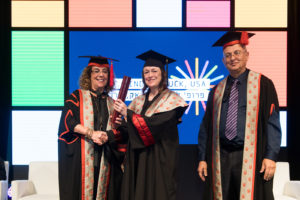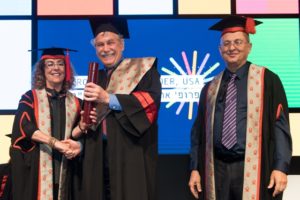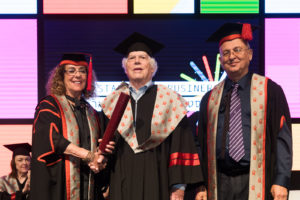
Three American Researchers Awarded BGU Honorary Doctorates
Three American Researchers Awarded BGU Honorary Doctorates
May 24, 2017
BGU recently awarded prestigious honorary doctoral degrees to three American researchers at its 47th Board of Governors in Beer-Sheva: a physiologist who specializes in the sense of smell, a pioneer in the Human Genome Project, and a researcher who discovered a protein that causes, and could be used to treat, Alzheimer’s and Parkinson’s disease.
Prof. Linda S. Buck, Nobel Prize winner, is a physiologist and researcher at the Fred Hutchinson Cancer Research Center in Seattle, Washington, and is an affiliate professor at the University of Washington.
 Prof. Buck was the first to identify a family of genes that control the olfactory system, a complex network that governs sense of smell.
Prof. Buck was the first to identify a family of genes that control the olfactory system, a complex network that governs sense of smell.
She received the 2004 Nobel Prize in Physiology or Medicine for her groundbreaking discoveries of odorant receptors and the organization of the olfactory system.
At the ceremony, BGU President Prof. Rivka Carmi conferred upon her the degree of Doctor Philosophiae Honoris Causa stating, “Prof. Buck is a distinguished researcher in the areas of molecular biology and neuropsychology and a groundbreaking scientist whose pioneering work unraveled the mystery behind genetic coding of olfactory receptors.
“Her work has impacted important new paths of study related to the human body and its perception of the world around us for the advancement of all.”
Prof. Buck is an outstanding role model for all young people and especially women who are interested in science and drawn to academic research.
View a brief video about Prof. Buck that was shown at the ceremony >>
Prof. Eric S. Lander is founding director and president of The Eli and Edythe L. Broad Institute of MIT and Harvard University.
 A geneticist, molecular biologist and mathematician, Prof. Lander has played a pioneering role in all aspects of the reading, understanding and biomedical application of the human genome.
A geneticist, molecular biologist and mathematician, Prof. Lander has played a pioneering role in all aspects of the reading, understanding and biomedical application of the human genome.
He was one of the principal leaders of the international Human Genome Project (HGP) from 1990 to 2003, with his center being the largest contributor to the mapping and sequencing of the human blueprint.
At the ceremony, BGU President Prof. Rivka Carmi conferred upon him the degree of Doctor Philosophiae Honoris Causa, stating that Prof. Lander “stands at the forefront of the assimilation of genetic information, whose innovative methods are applied to the study of diseases and their potential treatment, among them cures for cancer.
“He is a driving force behind the substantial progress in genomics and the founding director of the Broad Institute, matching first-class research institutions with hospitals and working across disciplines to revolutionize biomedicine.”
Prof. Lander has also dedicated himself to the mentoring of future generations of scientists and has demonstrated a profound commitment to the health of human beings around the world.
View a brief video about Prof. Lander that was shown at the ceremony >>
Prof. Stanley B. Prusiner, Nobel Prize winner, is the director of the Institute for Neurodegenerative Diseases and a professor of neurology and biochemistry at the University of California, San Francisco.
 He won the Nobel Prize in Physiology or Medicine in 1997 for his work in proposing an explanation for the cause of mad cow disease and its human equivalent, Creutzfeldt-Jakob disease.
He won the Nobel Prize in Physiology or Medicine in 1997 for his work in proposing an explanation for the cause of mad cow disease and its human equivalent, Creutzfeldt-Jakob disease.
Prof. Prusiner discovered an unprecedented class of pathogens that he named “prions,” which are proteins that acquire an alternative shape and become self-propagating. As prions accumulate, they cause neurodegenerative diseases in animals and humans.
Much of Prusiner’s current research focuses on developing treatments that reduce the levels of the specific prions responsible for Alzheimer’s and Parkinson’s diseases, multiple system atrophy, frontotemporal dementia, and chronic traumatic encephalopathy.
At the ceremony, BGU President Prof. Rivka Carmi conferred upon him the degree of Doctor Philosophiae Honoris Causa “with profound admiration for a brilliant physician and scientist whose trailblazing discovery of the prion proteins and their effects offered innovative tools for the investigation of the nervous system and are facilitating the development of therapeutics for a number of illnesses.”
Prof. Prusiner’s life’s work and research has focused on trying to understand and to help find cures for currently incurable diseases that have such a devastating effect on sufferers and their families.
View a brief video about Prof. Prusiner that was shown at the ceremony>>



